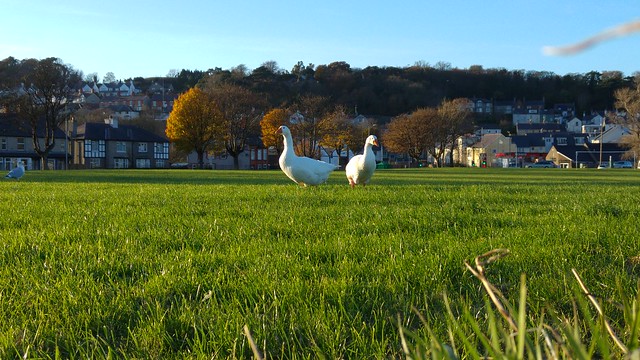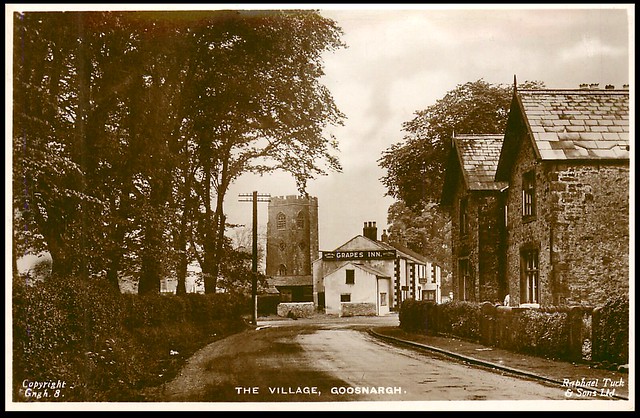What does the word goosnargh suggest to you?

A couple of geese that I encountered unexpectedly when walking around Bangor.
When I first came across this word the other day, I guessed it might be an exclamation you make when encountering an unexpected goose. Goosnargh!
Somewhat disappointingly, Goosnargh [ˈɡuːznər] is in fact a village between Broughton and Longridge in the City of Preston district of Lancashire in the northwest of England, not far from where I grew up. It’s apparently famous for its Goosnargh cakes, a type of caraway seed shortcake biscuit traditionally sold at Whitsun (the seventh Sunday after Easter).
Here’s a recipe: https://bakingforbritain.blogspot.com/2005/09/goosnargh-cakes-from-lancashire.html
The name comes the Old Irish name Gosan or Gusan and the Old Norse word erg (hill pasture), which is thought to come from the Old Irish áirge (a place for milking cows). Alternatively, it might come from the Old Norse gudhsins hörgi (“at the idol’s (god’s) temple”). Goosnargh appears in the Domesday Book as Gusansarghe, and by 1212 it had changed to Gosenargh.
Áirge became áirí (milking-place, herd (of cows), ground manured in previous year; ground from which potatoes have been cropped) in Irish, àirigh [aːrʲɪ] (hill pasture, bothy, sheiling, pastoral summer residence, sheiling (knitting pattern)) in Scottish Gaelic, and eairee (hill pasture, shieling) in Manx. The Faorese word ærgi [ˈaɹt͡ʃɪ] (a pasture for cattle to graze over the summer with a hut where the people tending them live meanwhile; a shieling, saeter) also come from the same roots.
According to Douglas Adams in his novel In So Long, and Thanks For All the Fish, goosnargh is a Betelgeusian word used by Ford Prefect “when he knew he should say something but didn’t know what it should be.”
However, in The Meaning of Liff, in which Douglas Adams’ gives comic meanings to British place names, goosnargh is defined as “Something left over from preparing or eating a meal, which you store in the fridge despite the fact that you know full well you will never ever use it.”
I certainly have a few goosnarghs (leftovers) in my fridge. How about you?
Sources: https://en.wikipedia.org/wiki/Goosnargh
https://en.wiktionary.org/wiki/Goosnargh
https://www.teanglann.ie/en/fgb/áirí
https://www.faclair.com/

I’m sorry, Simon, but the very idea of “goose nargs” sounds like something that the all-too-common Canadian geese around here leave on sidewalks everywhere. Besides, referring to those those nargs as “cakes” is staggeringly over-complimentary.
Not to mention, utterly hysterical. I busted a gut laughing so hard (I will have to call 911).
Robert
Simon, I find your original assumption that this word means ‘an exclamation you make when encountering an unexpected goose’ more convincing than all the etymology.